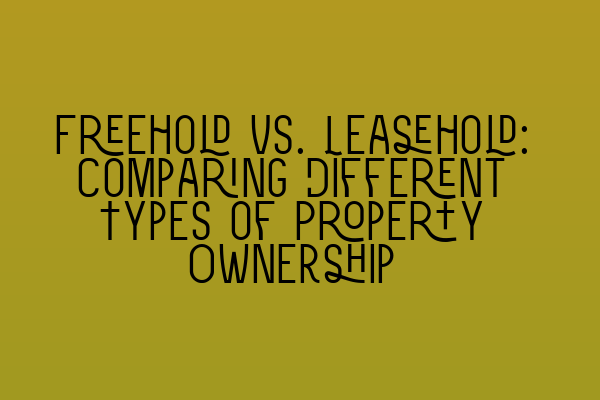Freehold vs. Leasehold: Comparing Different Types of Property Ownership
When it comes to buying a property, one of the most important decisions you’ll need to make is the type of ownership
you want. The two main types of property ownership in the UK are freehold and leasehold. Understanding the differences
between these two types is crucial to ensure you make an informed decision that best suits your needs. In this article,
we will compare freehold and leasehold ownership and explain their implications.
Freehold Ownership
Freehold ownership is often considered the most desirable form of ownership. When you purchase a freehold property,
you become the outright owner of both the property and the land it stands on. This means you have complete control
and ownership rights over the property, including the land it occupies. You are not bound by any lease or agreement
and have the freedom to make changes or alterations to the property without seeking permission from any external parties.
Freehold ownership provides a sense of security and independence. You are responsible for the maintenance and repair
of the property, but this also means you have the freedom to make decisions about its upkeep without relying on others.
Additionally, freehold properties often appreciate more over time compared to leasehold properties.
Therefore, if you plan to own the property for an extended period or want complete control over your property,
freehold ownership may be the most suitable option for you.
Leasehold Ownership
In contrast to freehold ownership, leasehold ownership is when you purchase the right to occupy a property for
a specific period of time, known as the lease term. The land on which the property stands remains owned by the
freeholder, who effectively becomes the landlord. The lease agreement sets out the terms and conditions of your
occupation, including any service charges, ground rent, and covenants you must adhere to.
Leasehold properties are often found in flats or apartment buildings where multiple units share the same land.
The freeholder, who typically owns the entire building, is responsible for maintaining communal areas, such as
hallways and gardens, and may charge leaseholders for these services. Additionally, the lease agreement may include
restrictions on alterations and subletting, which you need to consider before purchasing a leasehold property.
It’s important to note that once the lease term expires, ownership of the property reverts to the freeholder,
unless you successfully negotiate a lease extension or purchase the freehold. Therefore, if you’re considering buying
a leasehold property, you should carefully review the lease agreement, seek legal advice, and understand the potential
costs and obligations involved in extending the lease or purchasing the freehold in the future.
Which Option is Right for You?
The choice between freehold and leasehold ownership depends on your personal circumstances, preferences, and long-term
plans. If you prioritize independence, control, and have the financial means and commitment to maintain a property,
freehold ownership may be the better option.
On the other hand, if you’re purchasing a property for a shorter term, prefer the convenience of shared responsibility
for communal areas, or are considering a leasehold property in a desirable location, leasehold ownership could be
more suitable.
Whether you choose freehold or leasehold ownership, it is essential to seek professional advice from a qualified
solicitor specializing in property law. They can guide you through the process, review the legal documents, and help
you understand any potential risks or obligations associated with your chosen type of ownership.
Conclusion
In summary, freehold ownership grants you absolute ownership and control over the property and land, while leasehold
ownership involves purchasing the right to occupy a property for a limited period. Understanding the differences
between these types of ownership is vital in making an informed decision when buying a property.
Talk to SQE Property Law & Land Law Solicitors for expert advice on freehold and leasehold properties. Contact us now and schedule a consultation to discuss your property ownership needs!
Related Articles:
SQE 1 Practice Exam Questions
SQE 1 Practice Mocks FLK1 FLK2
SQE 2 Preparation Courses
SQE 1 Preparation Courses
SRA SQE Exam Dates
